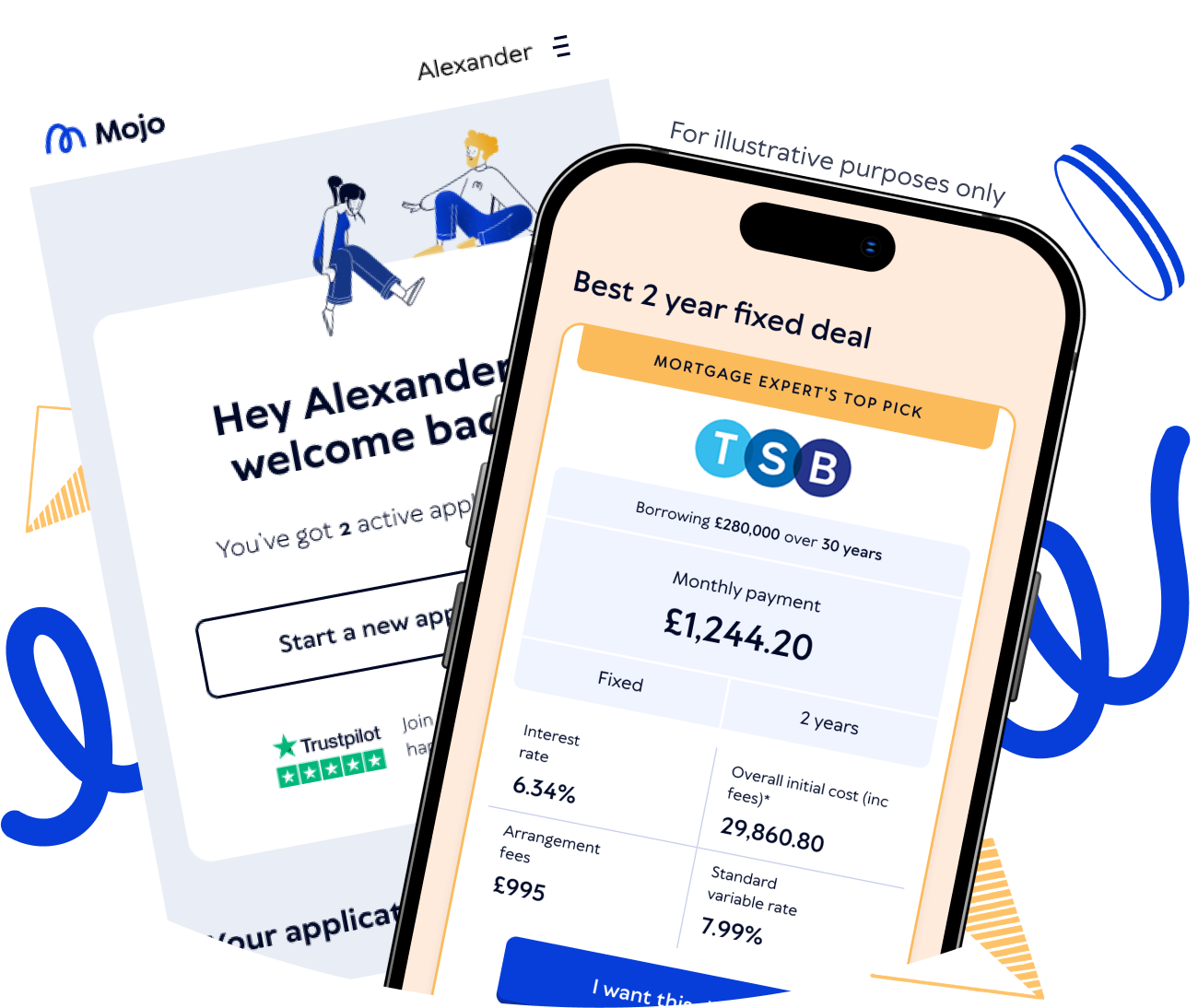How much does it cost to buy a home?
Your guide to mortgage fees and other homebuying costs
Buying a property isn’t cheap, but having an idea of how much you’ll need to spend can help you feel more confident as you head down the road of home ownership.


Quick summary
You’ll probably be prepared for many of the big costs involved in buying a home, such as your deposit - but lots of little extras can soon add up
It’s important to budget these other homebuying costs to make sure you’re not caught out when you’re setting your savings goal
The amount you’ll pay for things like stamp duty or surveys can vary depending on the type of property you buy and its price. Typically speaking, the more expensive your property, the more you’ll pay in fees too
Costs to consider before getting a mortgage
Deposit: 5%-10% of your property’s value
This is the chunk of the property's price that you pay upfront yourself. You'll typically need at least 5% of the property's value, but a larger deposit of 10% or more can give you access to better interest rates and a wider choice of deals.
According to our internal data, the average deposit size in the UK is £59,209 for first-time buyers.
Mortgage fees to consider
Product or arrangement fee: Around £1,000 to £2,000
Think of this as a lender's charge for setting up your mortgage. Product fees can cost up to a few thousand pounds, though not all mortgages have a product fee attached. You often have the choice to add this fee to your overall mortgage, but paying it upfront means you won't be charged interest on it which could save you money in the long-run.
Mortgage valuation fee: £100 to £1,500
Your lender will conduct a valuation survey to verify that the property is worth the amount you're borrowing. The cost for a mortgage valuation when buying a home can range from £100 to £1,500, though many mainstream lenders charge closer to the £100 mark and some may even waive this fee and include it as part of your mortgage deal.
Telegraphic transfer fee: £20 to £50
This banking fee, usually around £20-£50, covers the secure transfer of the mortgage funds from your lender to the solicitor. You may hear it referred to as a CHAPS (Clearing House Automated Payment System) fee too.
Higher lending charge: Varies
Though less common now than it used to be, a higher lending charge sometimes applies if you have a very small deposit (a high loan to value). This protects the lender against potential loss. It can be a significant cost, sometimes calculated as a percentage on the portion of the loan that is above a certain threshold (for example, anything over 90% of the property value).
Booking fee: £100 to £200
Some lenders charge a one-off fee of around £100-£200 to secure a specific mortgage product. This is often non-refundable, so you’ll need to pay it even if your property purchase doesn't go ahead.
Account fee: £100 to £300
This is an administrative fee, typically £100-£300, that some lenders charge for setting up and managing your mortgage account.
Mortgage broker fee: £0 to £500+
While some brokers charge a fee (often around £500 or a percentage of the amount you’re borrowing), Mojo Mortgages don’t - we’re paid a commission by the lender instead which keeps our services free to you.
Mortgage costs once you’ve bought a property
Monthly mortgage repayments: Varies
This will probably be your biggest regular expense (which is why it’s so important to choose the right mortgage deal). The average first-time buyer pays £1,239 for their mortgage each month*. If you opt for a repayment mortgage, you’ll make a payment to your lender each month that covers your interest and a portion of the original borrowing amount until the full amount is repaid.
Early repayment charges: Between 1% and 5% of your remaining loan
If you decide to overpay beyond your allowance, remortgage early, or pay off your entire mortgage before your initial deal period ends, you may need to pay penalty fees. Early repayment charges are usually a percentage of the remaining loan (normally between 1% and 5%).
Exit fee or deeds release fee: £50 to £300
Some lenders charge an administrative fee (around £50 to £300) to formally close your account once the mortgage is fully repaid. This could be when you remortgage, sell your property or pay off your mortgage in full.
Missed payment charges: Varies
Most lenders will apply a fee if you are late paying or miss a monthly mortgage payment. It’s so important to keep up with your payments, as missed ones can negatively impact your credit history which might make borrowing trickier (and more expensive) in the future.
Mortgage protection insurance: Varies
Protection insurance is highly recommended, though it’s not usually mandatory. Having suitable insurance in place provides a safety net to cover your mortgage payments in case of death, critical illness or job loss, ensuring your home is secure for your family.

“Whether to opt for a mortgage with a product fee is one of the big decisions when choosing a mortgage deal. Paying a product fee could give you access to lower interest rates, but opting for a fee-free deal with a slightly higher interest rate could be more cost-effective, particularly for those borrowing a smaller amount. When you work with a broker, we’ll calculate the true cost of the mortgage deals available to you, so you can feel more confident in your decision.”
Luke Butcher, Chief Revenue Officer
Costs and fees you’ll come across during the housebuying process
Property survey fees: £100 to £1,000+
Though not an absolute necessity, a survey can be valuable as it may highlight issues or problems with a property that you may wish to have resolved before you buy it. A basic Level 1 Home Survey could cost a few hundred pounds, while a comprehensive Level 3 Home Survey could cost £1,000 or more depending on the value of the property.
Conveyancing fees: £850 to £2,000
You'll need a solicitor or conveyancer to handle the legal side of things, like drafting contracts, transferring funds for the purchase and paying stamp duty. Expect to pay between £850 and £2,000 for a solicitor when buying or selling a property (you might not have to worry about solicitor’s fees when you remortgage, as many lenders include legal services for free as part of the deal).
Property searches: £200 to £300
Your solicitor conducts a range of local authority searches to uncover any issues, such as planning permissions or flood risks. This usually costs between £200 and £300 but the good news is it’s typically bundled into your conveyancer's overall fee.
Stamp Duty: Varies depending on property’s value
You’ll need to pay Stamp Duty Land Tax when you buy a property. This is called Land and Buildings Transaction Tax in Scotland and Land Transaction Tax in Wales. The amount you pay will depend on what type of buyer you are, how much your property costs and whereabouts in the UK you’re buying but it can cost you up to 12% on a portion of your property’s value. Check out our stamp duty calculator to find out how much you’ll need to pay.
Land Registry fee: £20 to £300+
The price you’ll pay to be registered as the owner of your home will depend on the property's value. Your Land Registry fee is paid via your solicitor and the cost depends on the property price, typically ranging from £20 to over £300 for most properties (though in some cases the fee can be more expensive).
Costs after you’ve bought a home
Moving costs: £400 to £1,000+
You might need some help to move your belongings to your new place. Hiring a professional removal service can cost anywhere from around £400 for a local move to over £1,000 for a larger family home - especially over a long distance.
Maintenance costs: Varies
Being a homeowner means you’re now responsible for all repairs and upkeep, from a small leaky tap to a full boiler replacement. It's a good idea to build a separate savings pot for any unexpected expenses.
Leasehold property fees: £0 to £1,000+
If you're buying a flat or leasehold house, you'll likely have to pay an annual service charge for the upkeep of shared areas and potentially ground rent to the freeholder. This can cost a few thousand pounds each year, depending on the location of your property.
Decorating and furnishing: Varies
It’s up to you how much you’ll spend making a house your home. Whether you just need a few tins of paint or you’re furnishing the whole property from scratch, be sure to budget for it.
Mail redirection: £41.50
Using a mail redirection service is really handy as it’ll help you avoid missing important documents after you move. Prices start from £41.50 for three months, giving you plenty of time to change your address over.
Ongoing bills: Varies
Remember to budget for your regular household running costs when buying a house. This includes Council Tax, utilities, buildings and contents insurance and any other bills such as broadband.

Are you ready to buy? Let’s get your mortgage sorted
Once you’ve saved for your deposit and budgeted for the additional costs associated with homeownership, it’s time to start looking for a mortgage.
Our qualified broker will compare deals from over 60 lenders to find the right option for you.
FAQs
As with most mortgage products, there are pros and cons. A fee-free mortgage means you won't pay an arrangement fee upfront, but these deals often come with a slightly higher interest rate compared to mortgages that do have a fee.
The right choice for you depends on your circumstances. If you have less cash available upfront, a fee-free deal can be worth considering. However, paying a fee upfront can result in lower rates and therefore reduced monthly payments, which can save you a significant amount of money in the long run. You should calculate the total cost over the initial deal period (for example, the first 2 or 5 years depending on how long you want to fix for) for both options to get a full picture of the price you’ll pay.
Most costs associated with buying a home, such as your valuation fee or legal costs, cannot be added to the mortgage loan and must be paid out of your own funds.
However, you may be able to add your product or arrangement fee to your mortgage loan. However, while this means you don’t have to worry about paying potentially thousands of pounds upfront, you need to remember that you’ll end up paying interest on this added fee for the entire term of the mortgage. This means you’ll pay back significantly more than the original fee amount.
No, they are very different.
A mortgage valuation is for your lender's benefit. It’s a brief inspection that allows them to confirm the property is worth the amount you want to borrow, but won't identify structural problems or other defects.
A property survey is for your protection as the buyer. It's a detailed inspection of the property's condition that highlights any potential issues, from damp to a faulty roof, which could save you from unexpected and expensive repairs later down the line.
Most lenders require you to have buildings insurance in place from the day you exchange contracts, to ensure your home (and their investment) is protected. It’s also highly recommended that you consider other types of insurance such as contents insurance to protect your belongings, and life or critical illness protection to ensure your mortgage payments are covered should the worst happen.
You won’t need to worry about the majority of homebuying costs you experienced when you first bought or moved home. However, there are a few mortgage costs you’ll need to think about when remortgaging, including:
Product or arrangement fees (depending on the type of mortgage you choose)
Early repayment charges (if you leave your existing deal before it ends)
Mortgage valuation fees (though some lenders may include this as part of the mortgage deal)
Legal fees (again, this may be covered by some lenders as an incentive for remortgaging with them)
https://mojomortgages.com/first-time-buyer-mortgages/how-much-deposit-do-i-need-to-buy-a-house
https://www.moneyhelper.org.uk/en/homes/buying-a-home/estimate-your-overall-buying-and-moving-costs
https://gocardless.com/guides/posts/major-uk-banks-chaps-fees/
https://www.halifax.co.uk/mortgages/help-and-advice/how-much-does-it-cost-to-remortgage.html
https://www.zoopla.co.uk/discover/buying/what-does-a-conveyancer-do/
https://www.gov.uk/guidance/hm-land-registry-registration-services-fees
https://www.zoopla.co.uk/discover/buying/how-much-do-removals-cost/
https://www.royalmail.com/personal/receiving-mail/redirection
*All data taken from Mojo Mortgages’ own customer records, covering 1 January 2025 to 30 June 2025.